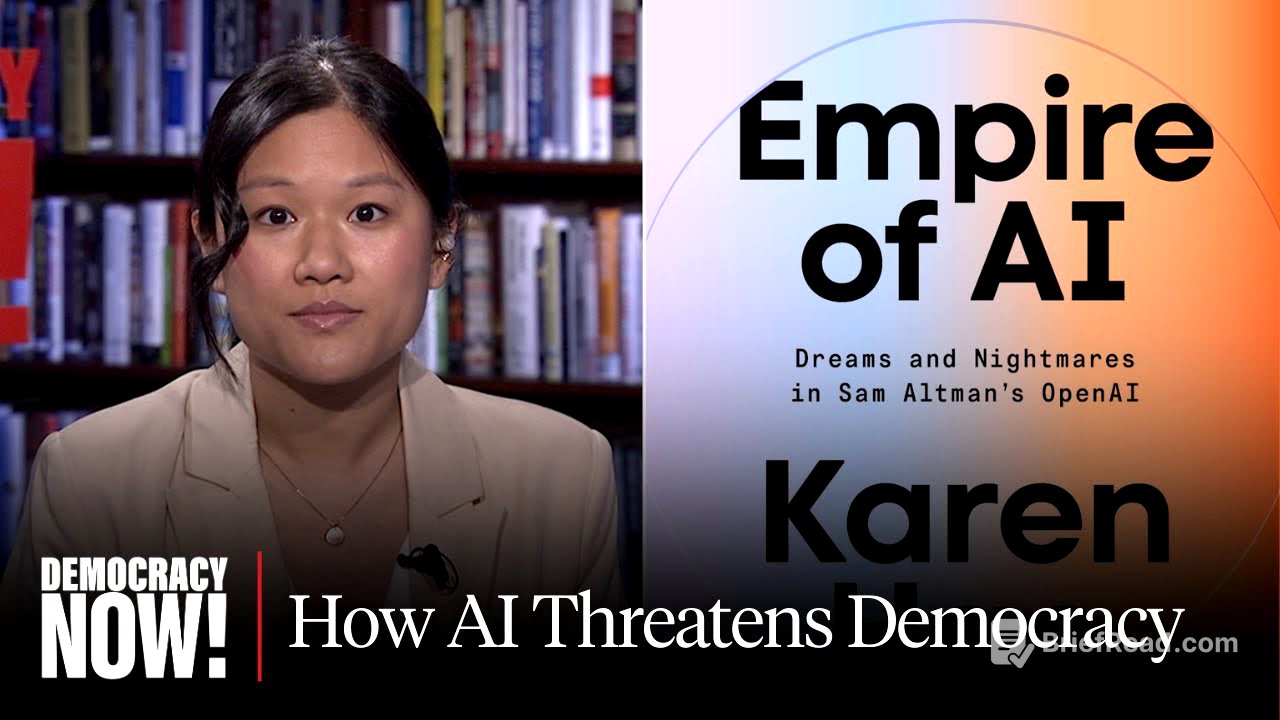TLDR;
Karen How discusses her new book, "Empire of AI: Dreams and Nightmares of Sam Altman's OpenAI," critiquing the Silicon Valley approach to AI development, particularly OpenAI's methods. She highlights the significant environmental and social costs associated with training AI models, including high energy and water consumption, and the exploitation of labor in the Global South. The conversation also touches on the military applications of AI, the resistance to data centers in communities like Chile, and the potential for regulatory capture by the AI industry.
- The AI industry's rapid expansion demands vast resources, leading to environmental and social harms.
- Data annotation firms in the Global South face exploitation and psychological trauma.
- Sam Altman and OpenAI embody Silicon Valley's "scale at all costs" approach, raising concerns about capitalistic incentives.
Introduction to "Empire of AI" [0:12]
Karen How introduces her book, "Empire of AI," which critiques Silicon Valley's "scale at all costs" approach to AI development, exemplified by OpenAI and Chat GPT. She argues that this trajectory of AI development is causing significant social, labor, and environmental harms. The book draws an analogy to historical empires, highlighting the seizure and extraction of resources—artisan writers' work, individual's data, and land, energy, and water—to fuel AI development.
Environmental Costs: Energy and Water Consumption [3:51]
The discussion shifts to the environmental impact of AI, focusing on the energy and water demands of data centers. Karen cites a McKenzie report estimating that AI computational infrastructure expansion will require energy equivalent to two to six times the annual consumption of California within five years, largely serviced by fossil fuels. She notes the revival of coal plants and the use of methane gas turbines to support data centers. Furthermore, she explains that data centers require freshwater, often sourced directly from public drinking water supplies, and that two-thirds of new data centers are being placed in water-scarce areas, exacerbating water access issues for local communities.
Military Applications of AI [5:46]
The conversation addresses the military applications of AI, with Silicon Valley companies increasingly becoming defense contractors. Karen explains that the high costs of developing AI technologies are driving companies like OpenAI to seek defense contracts to recoup investments. She expresses concern over the integration of these technologies into military infrastructure, noting that they are not designed for sensitive military contexts.
Community Resistance in Chile [7:04]
Karen details her reporting from Chile, where a community with access to a public freshwater resource is resisting the construction of a Google data center. The proposed data center would use a thousand times more freshwater annually than the community, without providing any direct benefits or tax revenue to the local population. Activists have successfully blocked the project for four to five years and gained a seat at the table in discussions with the Chilean government and Google representatives.
Exploitation in the Global South: Data Annotation Firms [9:55]
The discussion turns to the exploitation of labor in the Global South, specifically within data annotation firms. Karen explains that these firms hire contract workers to clean and annotate data used to train AI models. OpenAI contracted firms in Kenya to moderate content, exposing workers to harmful and graphic text while paying them low wages. These workers often suffer psychological trauma, highlighting the stark disparity between their compensation and the million-dollar packages of AI researchers in Silicon Valley.
Sam Altman and the Story of OpenAI [12:26]
Karen discusses Sam Altman's background and his role in shaping OpenAI. Altman, a product of Silicon Valley, previously served as president of Y Combinator. His strategic vision led OpenAI to adopt a "scale at all costs" approach to AI development. Initially founded as a nonprofit, OpenAI shifted to a for-profit model to attract the capital needed to pursue its ambitious goals. Altman's fundraising prowess has transformed OpenAI into one of the most capitalistic companies in Silicon Valley, despite the technology's middling economic impact thus far.
Competition and Regulation in the AI Industry [15:21]
The conversation touches on the competitive landscape of the AI industry, with former OpenAI executives creating rival companies. Karen also addresses the proposed regulation within the "big beautiful bill" that would prevent states from regulating AI for a decade. She argues that this would enshrine the impunity of Silicon Valley into law, allowing AI companies to act in their self-interest without accountability.









